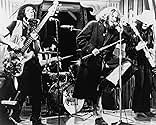Ian Anderson(IV)
- Music Artist
- Actor
- Composer
Ian Anderson, born in Fife, Scotland, is one of the most famous flautists of the last 40 years. A singer and composer, Anderson is also a multi instrumentalist, including acoustic and electric guitars, saxophone, percussion, keyboards, bagpipe, violin, balalaika, clarinet and a large variety of whistles. He is the lead vocalist and founding member of the innovative and influential progressive rock band Jethro Tull. Ian Anderson's style mixes folk, Celtic, jazz, rock, blues and pop, and his lyrics are complex, acerbic and critical of society and religion.
As a flute-player, Anderson is self-taught, his style inspired by another accomplished flautist, Rahsaan Roland Kirk. In 1963 his fellow school friends Barriemore Barlow (drums), John Evan (keyboards), Jeffrey Hammond Hammond (bass guitar) and Michael Stephens (guitar), with Anderson taking singing and harmonica playing duties, formed their first band The Blades, a soul and blues outfit. In 1965 they regrouped into The John Evan Band with major lineup changes. They disbanded two years later when Anderson moved to Luton. In his new surroundings, Ian met the drummer Clive Bunker and the guitarist Mick Abrahams, formerly of McGregor's Engine. With Glenn Cornick, a bassist of The John Evan Band, Anderson created the seed of the group that would become the legendary Jethro Tull. Later, the band would have an ongoing change of members. The most important being the incorporation of Martin Lancelot Barre (guitar), the only musician to remain in the band for more than four decades, who replaced Mick Abrahams in 1969. They also gained Mark Craney (drummer), David Palmer (orchestral arranger) and Eddie Jobson (keyboards and violin, ex-UK and Roxy Music).
Alongside his musical pursuits, he and his wife are the owners of a group of companies including salmon farms in the UK, and as far reaching as Chile, South America. The singer has survived a serious deep vein thrombosis, suffered after air travel. His voice has also suffered in his later years with vocal chord problems.
As a flute-player, Anderson is self-taught, his style inspired by another accomplished flautist, Rahsaan Roland Kirk. In 1963 his fellow school friends Barriemore Barlow (drums), John Evan (keyboards), Jeffrey Hammond Hammond (bass guitar) and Michael Stephens (guitar), with Anderson taking singing and harmonica playing duties, formed their first band The Blades, a soul and blues outfit. In 1965 they regrouped into The John Evan Band with major lineup changes. They disbanded two years later when Anderson moved to Luton. In his new surroundings, Ian met the drummer Clive Bunker and the guitarist Mick Abrahams, formerly of McGregor's Engine. With Glenn Cornick, a bassist of The John Evan Band, Anderson created the seed of the group that would become the legendary Jethro Tull. Later, the band would have an ongoing change of members. The most important being the incorporation of Martin Lancelot Barre (guitar), the only musician to remain in the band for more than four decades, who replaced Mick Abrahams in 1969. They also gained Mark Craney (drummer), David Palmer (orchestral arranger) and Eddie Jobson (keyboards and violin, ex-UK and Roxy Music).
Alongside his musical pursuits, he and his wife are the owners of a group of companies including salmon farms in the UK, and as far reaching as Chile, South America. The singer has survived a serious deep vein thrombosis, suffered after air travel. His voice has also suffered in his later years with vocal chord problems.















